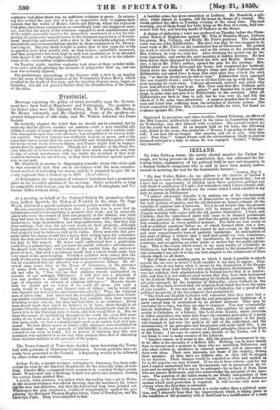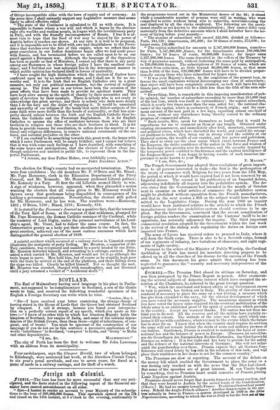IRELAND.
Sir John Dalberg Acton, the newly elected member for Carlow bo- rough, not being present on the nomination day, has addreised the fol- lowing letter, explanatory of his political faith in men and measures, to a Roman Catholic clergyman who is said to have been mainly instru- mental in securing the seat for the honourable baronet- " London, May 8. " My dear Father Maher—In my address to the electors of Carlow I
touched upon some of the chief topics of interest at the present day; as I have had no opportunity of dilating upon these questions, perhaps you will think it satisfactory if I add a few remarks to what I have already said, and endeavour briefly to sketch out the course which I shall consider it my duty to pursue in Parliament. I cannot adequately describe it by making use of the old-fashioned- party-designations. The old lines of demarcation no longer coincide with the real position of parties, and the old divisions no longer exhaust all the. varieties of opinions and of interests. Yet I do not believe that the present confusion will continue. New parties will be formed, and the old system of party morality-will expire with the old parties themselves. I hope, and I believe, that the interests of party will cease to be deemed paramount above the interests of the country, and that the public good will become the first consideration in every political measure. For there are vast social as well as political questions before us, of which Ireland offers not a few,. which cannot be put off, and which cannot be met except on the broadest and most comprehensive basis of patriotic legislation. In anticipation of this state of things I believe that I shall best satisfy my own conscience, and beat fulfil may duty towards my constituents, by preserving my inde- pendence, and recognizing no other guide or motive but the public advan- tage. This is the course which seems to me most worthy of a Catholic in Parliament, and though it may not be well suited to the promotion of pi.., vats interests I am sure it is the one best adapted to the attainment of those objects which we all desire.
" But if there is no existing party to which I think it possible to attach
myself, the one now in power I shall consider it my duty to oppose. Eng- lishmen, who do not know what is meant by the domination of the Orange faction, may deem Lord Derby's a fair and conciliatory Government. Who ever has watched their administration in Ireland knows that it is intoler- able, and that it is not without good reason that they have been denounced by the Catholic Bishops. By challenging the Catholic jurymen, they have not only outraged, by the suspicion of disloyalty, every Catholic in the land, but they have revived that old religious fend which has been the curse of your country. It was not only an insult to Catholics, but a proof of the political incapacity of the Government that permitted it.
" The Irish and English Catholics will remember that they have had a new and impressive proof of it that the real principles and traditions of a party cannot long be neutralized by its present interests. They may be concealed for a time, but they are sure to reappear. You may occasionally find an individual Tory, like Mr. Disraeli, who exhibits no special ani-
mosity to Catholics, or a Liberal, like Lord John Russell, whose interests or whose prejudices may make him forget the constant principles of a party which was their advocate for sixty years ; but the principles of the party will triumph at last over the good or ill will of the individual, and the inconsistency of his principles and his practice will make itself felt. I am no partisan, but I had rather reckon on Liberal principles than on the fears of the Tories. I am sure we cannot make friends of the Tories, and I do not think it wise to make enemies of the Liberals.
" Another reason, as it seems to me, why the present Government is un-
fit for office is the necessity of a Reform Bill. Nothing can be more unsafe than to entrust such a measure to those who are unwilling Reformers, and who adopt reform in obedience to external pressure, not in pursuance of their own ideas. Their own interests, not those of the country, dictate their measure. As they have no definite aim, so they will be stopped by no barriers. Their changes would be repeated as often and carried as far as the popular cry may demand. If we are to have reform—and for my part I cannot understand how our Government can be preserved in its vi- gour and its integrity if it is not to be reformed—let us have it from those who are sincere Reformers, and who acknowledge the necessity of the mea- sure. The question of the ballot seems to me wholly independent of that of reform ; as the franchise at present stands, there is a species of influence against which such protection is required. It will become still more ne- cessary when the franchise is extended. " The position of the Irish tenant is a social rather than a political ques- tion, and -I sincerely hope that the improvement which is taking place in the condition of the peasantry will of itself lead to a modification of a state
of things incompatible alike with the laws of equity and of economy. At the same time I shall earnestly support any Legislative measure that seems likely to afford effective relief. " The state of the Continent is calculated to fill us with alarm. It is impossible to fosesee where a war will end which is begun by the absolute ruler of a warlike and restless people, in league with the revolutionary party in Italy, and with the friendly encouragement of Russia. I fear it is al- most vain to hope that the flood of war may be stayed by the power of Austria before it reaches our shores. At any rate it is well to be prepared, and it is impossible not to be filled with awe and thankfulness to the Provi- dence that watches over the fate of this empire, when we reflect that the great convulsion in our Indian dominions began after we had made peace with Russia, and has terminated before we are called upon to be on our guard against a European war. Although the language of the Opposition has been as pacific as that of Ministers, I cannot say that there is any party among our Statesmen in whose foreign policy I have the smallest confi- dence, and I feel that our best safeguard lies in the determined manner in which public opinion has declared itself in favour of neutrality.
" I have sought the high distinction which the electors of Carlow have conferred upon me by no unworthy means, and I shall use it for no un- worthy end. It is to the Irish that we English Catholics owe in a great measure, not only our political emancipation, but the revival of religion among us. The Irish poor in our towns have been the occasion of the great efforts that have been made to provide for spiritual wants. They have ke alive among us the spirit of charity by their necessities and the spirit of pt devotion by their example. There is nobody who is not ready to acknowledge this great service, and there is nobody who feels more deeply than I do the duty and the desire of repaying it. It would be unnatural and unworthy of our religion if the bonds that unite fellow-subjects of the same faith were more feeble than the bonds of nationality, or that less sym- pathy should subsist between the Irish and the English Catholic than be- tween the Catholic and the Protestant Englishman. It is for English Catholics to assume the office of mediators between those who are their brethren in religion and those who are their brethren in blood. It is for them to provide reasons for conciliation, to soften down the asperity of na- tional and religious differences, to remove national resentment on the one hand, and national prejudice on the other.
"If I am enabled to do something towards this great work, the hopes with which I enter Parliament will be amply felfilled; and I cannot but believe that it was with some such feelings as I have described, with something of the same hopes and antioipationa, that the electors of Carlow chose me, though unknown and untned in public life, to represent them in the Im- perial Parliament.
"I remain, my dear Father Maher, ever faithfully yours, JOHN DALDERG ACTON."
The election for King's county had an unexpected termination. There were four candidates : the old members Mr. P. O'Brien and Mr. Bland ; Mr. Pope Hennessy, clerk in the Education Department of the Privy Council, and Mr. Kennedy. Mr. Hennessy professed Liberal politics ; Mr. Kennedy is a Tory. At first the old Liberals seemed likely to win. A sign of weakness, however, appeared, when they placarded a notice warning the electors that all votes given to Mr. Hennessy would be thrown away that gentleman being disqualified in consequence of his holding a government situation. Nevertheless, the electors still polled for Mr. Hennessy, and he has won. The numbers were—Hennessy, 1302 ; O'Brien, 1290 ; Bland, 1216 ; Kennedy, 818.
It is stated by the Freeman's Journal as a positive fact, that the tenantry of the Tory Earl of Bosse, at the request of. that nobleman, plumped for Mr. Pope Hennessy, the Roman Catholic nominee of the Cardinal, while the tenantry of Lord Digby, under the personal surveillance of his Lord- ship's agent, Mr. Trent, had to follow the same course. In fact, the Conservative gentry as a body put their shoulders to the wheel, and, by great exertion, achieved one of the most curious successes which have distinguished the general election of 1859.
A painful accident which occurred at a railway station in Limerick county illustrates the malignity of party feeling. Mr. Houston, a supporter of the Tory candidate, was recognized and assailed by a party headed by one Boles. Mr. Houston defended himself, and retreating to a carriage, entered. Boles seized a stick carried by Mr. Houston, and would not let it go although the train began to move. Men held him, but of course as he stupidly kept pace with the train he arrived at the end of the platform, and there falling down the steps was killed. Clearly he killed himself. Not so thought the mob. Hr. Heuston was arrested, charged with manslaughter, and not liberated until a jury returned a verdict of " Accidental death " !



























 Previous page
Previous page